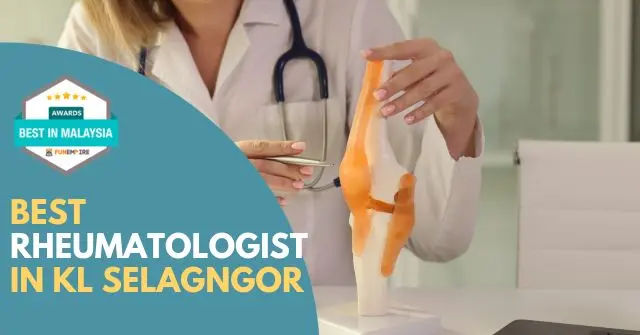Hi! Welcome to FunEmpire 👋
We take pride in finding the best local experiences, activities and services. We only recommend what we love, and hope you love them too. Learn about our story.
Rheumatologist KL Selangor

Are you struggling with joint pains and other related symptoms? You should go to a rheumatologist as soon as possible! Rheumatologists are experts in alleviating the pain associated with arthritis, gout, lupus, osteoarthritis, and many more conditions. In this article, we will introduce you to the 5 Best Rheumatologists in KL & Selangor.
1. Prince Court Medical Centre -Rheumatology
- Key Services: Rheumatologist
- Website: https://princecourt.com/?doctor=dato-dr-mohammed-shahdan-shahid
- Address: 2D, Level 2, 39, Jalan Kia Peng, 50450 Kuala Lumpur, Malaysia
- Phone: +603-2160 0000 (24-hour line), +603-2160 0999 (emergency line)
- Email: corporate.affairs@princecourt.com
The Prince Court Medical Centre (PCMC) is one of the finest medical tourism hospitals in Malaysia for its world-class amenities, international norms, and outstanding care.
Whether you’re a local or a visitor, getting an appointment with a rheumatologist at PCMC is simple and straightforward. With either of their two rheumatologists’ qualifications and appointments available on their websites, you may easily schedule an appointment online.
Both of their rheumatologists practice on the second floor of the PCMC building, which is conveniently located in Kuala Lumpur’s downtown area.
They have a fantastic facility with big lobbies, indoor and outdoor parking, a convenience store, a café, and all the facilities you could need for a pleasant stay.
Key Differentiators:
- Comprehensive medical care
- Highest international standard
- World-class facilities
2. Gleneagles Hospital Kuala Lumpur -Rheumatology
- Key Services: Rheumatologist
- Website: https://gleneagles.com.my/kuala-lumpur/doctors
- Address: Block A & Block B, 286 & 288, Jalan Ampang, Kampung Berembang, 50450 Kuala Lumpur, Wilayah Persekutuan Kuala Lumpur, Malaysia
- Phone: Ambulance / Emergency +603 4141 3018
- Email: my.gkl.inquiry@parkwaypantai.com
Gleneagles Hospital is one of Malaysia’s leading hospitals, with medical centers in various parts of Malaysia.
They’re at the top of our list for their sophisticated equipment, contemporary facilities, and several rheumatologists in Kota Kinabalu, Kuala Lumpur, and Penang.
The Hospital is well-equipped with modern technologies and equipment. They have four rheumatologists, two of which are in Kuala Lumpur, so getting an appointment will be easier. Despite the fact that their hospitals vary in terms of diagnostic capabilities, they all provide comprehensive diagnostic services, thus you should be able to get all of your lab tests and examinations
You can think of Gleneagles as a one-stop place for all your medical needs since their hospitals are equipped with general facilities like 24-hour emergency response, laboratories, patient rooms, pharmacies, parking areas, and specialist clinics.
Key Differentiators:
- Best in healthcare and management
- Complete and comprehensive solutions
- Pioneer in medical breakthroughs with international experts
3. UM Specialist Centre – Rheumatology
- Key Services: Rheumatologist
- Website: https://umsc.my/hospital-of-hospitals/rheumatology/
- Address: UMSC Building, Lot 28, Lorong Universiti, Lembah Pantai,50603 Kuala Lumpur, Malaysia
- Phone: +603-7841 4000, +603-78414143 (fax)
- Email: enquiries@umsc.my
The UM Specialist Centre is a tertiary medical center that has been in operation since 1998. They have a big facility with facilities such as parking, a café, and several waiting areas.
The Department of Rheumatology, Universiti Malaya’s Faculty of Medicine has three resident rheumatologists: Dr. Fariz Yahya and Dr. Raja Jasmin Begum Raja Mohamed, and Dr. Sargunan Sockalingam, who is also fluent in Tamil.
Key Differentiators:
- Fully facilitated 100 Inpatient beds
- Dedicated multi-disciplinary specialist and professional staffs
- 40 Clinic rooms, 4 Dental clinics and dedicated operating theaters
4. Sunway Medical Centre – Rheumatology
- Key Services: Rheumatologist
- Website: https://www.sunwaymedical.com/speciality/rheumatology
- Address: No. 5 Jalan Lagoon Selatan, Bandar Sunway, 47500 Selangor, Malaysia
- Phone: AMBULANCE +6019-305 8805 / EMERGENCY HELP +603-5566 8888
- Email: smc@sunway.com.my
Sunway Medical Centre is a well-known medical facility that has been continuously developing its infrastructure and services since 1999. They provide comprehensive tertiary care, as well as many facilities such as patient rooms, operating theaters, multi-story car parks, medical laboratories, and numerous specialists.
On weekdays and Saturdays, they have three in-house rheumatologists who are accessible during the day. Their clinics are located in Tower C and Tower A, which should be easier to get around.
You can quickly look up their credentials online and schedule an appointment with their step-by-step procedure that allows you to see the available appointments and choose whether you want a clinical visit or an online consultation.
Key Differentiators:
- Comprehensive tertiary healthcare services
- Advanced medical technologies for outpatient and inpatient speciality care
- Health and wellness programmes and 24-hour emergency services
5. Pantai Hospital – Rheumatology
- Key Services: Rheumatologist
- Website: https://www.pantai.com.my/find-doctor
- Address: 8, Jalan Bukit Pantai, 59100 Kuala Lumpur, Malaysia
- Phone: Emergency Department/Ambulance Service +603–2296 0999
- Email: my.phbp.admin@parkwaypantai.com
A Pantai Hospital may be found almost anywhere in Malaysia, such as Selangor, Johor, and Kuala Lumpur. They have the most branches in the country as well as the most rheumatologists of any of the hospitals on this list.
They currently have six rheumatologists in Pantai Hospitals in Kuala Lumpur, Ipoh, Cheras, and Laguna Merbok. Two of their rheumatologists operate out of Kuala Lumpur.
Their medical facilities are top-notch, with a wide range of diagnostic testing and general treatments. They also have world-class specialists who can help you get the finest care available in the country.
Key Differentiators:
- Quality healthcare
- Online consultation
- Fast and caring 24-hour accident and emergency service
Rheumatologist KL Selangor
Whether you want to schedule an appointment or get your diagnosis online, these top-notch facilities are worth checking out!
Check out the links below to read other articles on our site:
- Best ENT Specialists in KL & Selangor (2025)
- Best Urologists in KL & Selangor (2025)
- Best Skin Specialists in KL & Selangor (2025)
- Best Rheumatologists in KL & Selangor (2025)
u003cstrongu003eWhat is a Rheumatologist in KL u0026amp; Selangor?u003c/strongu003eu003cbru003e
A rheumatologist is a physician who specializes in the diagnosis and treatment of conditions affecting the joints, muscles, and bones. Rheumatologists often work with patients who have arthritis, although they may also treat other conditions such as gout, lupus, and fibromyalgia. KL u0026amp; Selangor has many qualified rheumatologists who can provide expert care for patients.u003cbru003eu003cbru003eu003cbru003eThese doctors have extensive experience treating various conditions affecting the joints, muscles, and bones. They use the latest diagnostic tools and treatments to help their patients improve their quality of life. If you are experiencing pain or other symptoms affecting your joints, muscles, or bones, make an appointment with one of these top rheumatologists in KL u0026amp; Selangor.u003cbru003eu003cbru003eu003cbru003e
u003cstrongu003eWhat type of rheumatic diseases are there?u003c/strongu003eu003cbru003e
There are many different types of rheumatic diseases, including:u003cbru003eu003cbru003e- Arthritis: There are more than 100 different types of arthritis, all of which affect the joints to varying degrees. The most common types include osteoarthritis (wear-and-tear arthritis), rheumatoid arthritis (an autoimmune disease that can cause inflammation and deformity), and gout (a type of arthritis caused by excess uric acid in the body).u003cbru003eu003cbru003e- Lupus: Lupus is a chronic autoimmune disease that can cause inflammation, pain, and damage to any part of the body. It is estimated that 1.5 million Americans have lupus.u003cbru003eu003cbru003e- Fibromyalgia: Fibromyalgia is a chronic condition that causes widespread pain, fatigue, and other symptoms. It is estimated that 3-6% of the world population has fibromyalgia.u003cbru003eu003cbru003e- Sjögren’s syndrome: Sjögren’s syndrome is an autoimmune disease that affects the glands that produce tears and saliva. It is estimated to affect up to 4 million Americans.
u003cstrongu003eWhat are the symptoms of rheumatic diseases?u003c/strongu003eu003cbru003e
The symptoms of rheumatic diseases vary depending on the condition. However, some common symptoms include:u003cbru003e- Joint painu003cbru003e- Muscle painu003cbru003e- Fatigueu003cbru003e- Feveru003cbru003e- Weight lossu003cbru003e- Rashu003cbru003e- Depressionu003cbru003eu003cbru003eu003cbru003eIf you are experiencing any of these symptoms, make an appointment with a rheumatologist. These doctors can determine if you have a rheumatic disease and develop a treatment plan to help relieve your symptoms.
u003cstrongu003eWhat are the treatments for rheumatic diseases?u003c/strongu003eu003cbru003e
There is no cure for most rheumatic diseases. However, there are treatments available that can help to manage the symptoms and improve the quality of life for those who have these conditions. Treatments for rheumatic diseases include:u003cbru003e- Medications: There are many different types of medications used to treat rheumatic diseases, including pain relievers, anti-inflammatory drugs, disease-modifying antirheumatic drugs (DMARDs), and biologic agents.u003cbru003e- Physical therapy: Physical therapy can help to strengthen the muscles and improve joint function.u003cbru003e- Surgery: In some cases, surgery may be necessary to repair damage caused by a rheumatic disease.u003cbru003eu003cbru003eu003cbru003eRheumatologists will work with you to develop a treatment plan that is right for you.u003cbru003e
u003cstrongu003eAre there different types of rheumatology?u003c/strongu003eu003cbru003e
– Pediatric rheumatology: This type of rheumatology focuses on the diagnosis and treatment of rheumatic diseases in children.u003cbru003e- Adult rheumatology: This type of rheumatology focuses on the diagnosis and treatment of rheumatic diseases in adults.u003cbru003e- Sports medicine rheumatology: This type of rheumatology focuses on the diagnosis and treatment of sports-related injuries.u003cbru003e- Geriatric rheumatology: This type of rheumatology focuses on the diagnosis and treatment of rheumatic diseases in older adults.u003cbru003eu003cbru003eu003cbru003eRheumatologists may specialize in one or more of these types of rheumatology.u003cbru003e
u003cstrongu003eWhat are some rheumatic diseases?u003c/strongu003eu003cbru003e
There are many different types of rheumatic diseases, including:u003cbru003e- Arthritis: There are more than 100 different types of arthritis, all of which affect the joints to varying degrees. The most common types include osteoarthritis (wear-and-tear arthritis), rheumatoid arthritis (an autoimmune disease that can cause inflammation and deformity), and gout (a type of arthritis caused by excess uric acid in the body).u003cbru003e- Lupus: Lupus is a chronic autoimmune disease that can cause inflammation, pain, and damage to any part of the body. It is estimated that 1.5 million Americans have lupus.u003cbru003e- Fibromyalgia: Fibromyalgia is a chronic condition that causes widespread pain, fatigue, and other symptoms. It is estimated that 3-6% of the world population has fibromyalgia.u003cbru003e- Sjögren’s syndrome: Sjögren’s syndrome is an autoimmune disease that affects the glands that produce tears and saliva. It is estimated to affect up to 4 million Americans.u003cbru003eu003cbru003eu003cbru003eThese are just a few of the many different types of rheumatic diseases. Rheumatologists are experts in the diagnosis and treatment of all of these conditions.u003cbru003e
u003cstrongu003eWhat are some tissue disorders?u003c/strongu003eu003cbru003e
There are many different types of tissue disorders, including:u003cbru003e- Scleroderma: Scleroderma is a chronic condition that causes the hardening and tightening of the skin. It is estimated to affect 300,000-500,000 Americans.u003cbru003e- Myositis: Myositis is a group of chronic inflammatory diseases that affect the muscles. It is estimated to affect 100,000 Americans.u003cbru003e- Vasculitis: Vasculitis is a group of chronic inflammatory diseases that affect the blood vessels. It is estimated to affect 1 in every 3,000 people in the United States.u003cbru003eu003cbru003eu003cbru003e
u003cstrongu003eWhat are autoimmune diseases?u003c/strongu003eu003cbru003e
Autoimmune diseases are chronic conditions in which the body’s immune system attacks healthy cells, tissues, and organs. Autoimmune diseases can affect any part of the body, and there are more than 80 different types that have been identified. Some of the more common autoimmune diseases include rheumatoid arthritis, lupus, and multiple sclerosis. It is estimated that 50 million Americans have an autoimmune disease.u003cbru003e
u003cstrongu003eHow do the treatments work?u003c/strongu003eu003cbru003e
The goal of treatment is to reduce pain, improve function, and prevent further damage. The specific treatments that are used will depend on the type of rheumatic disease you have.u003cbru003eu003cbru003eu003cbru003eCommon treatments for rheumatic diseases include:u003cbru003e- Medications: There are many different types of medications that can be used to treat rheumatic diseases. These include over-the-counter medications, prescription medications, DMARDs, and biologic agents.u003cbru003e- Physical therapy: Physical therapy can help to strengthen the muscles and improve joint function.u003cbru003e- Surgery: In some cases, surgery may be necessary to repair damage caused by a rheumatic disease.
u003cstrongu003eWhat is connective tissue?u003c/strongu003eu003cbru003e
Connective tissue is a type of tissue that connects, supports, and binds together other tissues and organs in the body. It includes things like tendons, ligaments, cartilage, and bone. Connective tissue disorders are conditions that affect the structure and function of connective tissue.u003cbru003e
u003cstrongu003eWhat are some connective tissue disorders?u003c/strongu003eu003cbru003e
There are many different types of connective tissue disorders, including:u003cbru003e- Ehlers-Danlos syndrome: Ehlers-Danlos syndrome is a group of inherited disorders that affect the connective tissues. It is estimated to affect 1 in 5,000 people.u003cbru003e- Marfan syndrome: Marfan syndrome is an inherited disorder that affects the connective tissue. It is estimated to affect 1 in 5,000-10,000 people.u003cbru003e- Osteogenesis imperfect: Osteogenesis imperfecta is a group of inherited disorders that affect the connective tissue. It is estimated to affect 1 in 10,000 people.u003cbru003e
u003cstrongu003eWhat are some common symptoms of rheumatic diseases?u003c/strongu003eu003cbru003e
The symptoms of rheumatic diseases can vary depending on the type of disease you have. However, there are some common symptoms that are associated with these conditions, including:u003cbru003e- Pain: Pain is a common symptom of rheumatic diseases. It can range from mild to severe and can be constant or intermittent.u003cbru003e- Inflammation: Inflammation is a common symptom of rheumatic diseases. It can cause swelling, redness, and warmth in the affected area.u003cbru003e- Joint damage: Joint damage is a common symptom of rheumatic diseases. It can cause pain, stiffness, and loss of range of motion.u003cbru003e- Fatigue: Fatigue is a common symptom of rheumatic diseases. It can be mild or severe and can make it difficult to do everyday activities.u003cbru003eu003cbru003eu003cbru003e
u003cstrongu003eWhat are some tips for living with a rheumatic disease?u003c/strongu003eu003cbru003e
There are many things that you can do to manage your rheumatic disease and maintain a good quality of life. Some tips for living with a rheumatic disease include:u003cbru003e- Get regular exercise: Exercise can help to improve joint function and reduce pain.u003cbru003e- Eat a healthy diet: Eating a healthy diet can help to reduce inflammation.u003cbru003e- Take your medications: Be sure to take your medications as prescribed by your doctor.u003cbru003e- Rest when you need to: It is important to get enough rest when you have a rheumatic disease.u003cbru003e- Stay positive: Having a positive attitude can help you cope with living with a rheumatic disease.u003cbru003e
u003cstrongu003eHow does the rheumatic disease affect the musculoskeletal system?u003c/strongu003eu003cbru003e
Rheumatic diseases can affect the musculoskeletal system in a number of ways. These conditions can cause joint pain, inflammation, and damage. Additionally, rheumatic diseases can also affect the muscles, tendons, and ligaments. This can lead to muscle weakness and pain.







